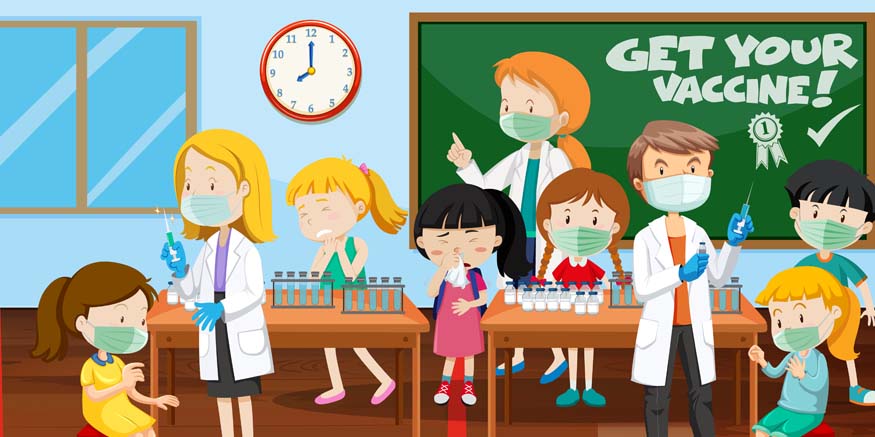How Schools Promote Better Health for the Students?

As is popularly said – health is wealth. Maintaining a healthy body and mind is paramount, and learning to do so is necessary. For a child, school is equally important in maintaining their health as their homes. Beyond teaching the children from textbooks, schools need to nurture every child’s physical, emotional, behavioural, and mental health. This mission can be achieved through several means but health education in school is at the center. Let us understand more about ways to ensure better health of students in schools.
What is health and what impact does school have on it?
Health is an overall state of being that helps people function. It is not just about physical injuries and ailments but also mental, behavioural, and emotional functioning. Good health overall means a stress-free open mind, happy emotions, an empathetic and welcoming nature along an energetic body. But how can the school help with it? School can help with a child’s health in many ways such as:
- Health Education in Schools
- Behavioural training and impact
- Socializing Skills and Well-being
- Spreading awareness on Future Impacts
- Understanding Rights to Health and Accessing It
Role of Health Education in Schools to Maintain Students’ Health
Health is not limited to just the human body but also physical, mental, intellectual, spiritual, environmental, sexual, and reproductive health. Thus, for a students’ overall growth schools must also focus on their health overall. Health Education is something that along with health promotion helps spread awareness and knowledge of health and well-being. Health education talks about health concerns and policies that impact health concerns and treatments, practices for better health, preventions, and precautions. As WHO stated, Health Education is a way to improve the general health and well-being of the community through knowledge and education towards it.
Topics to Discuss for Better Knowledge and Awareness of Health to Students
Apart from health education for students here are some other topics that schools can teach about to spread awareness and knowledge on the matter of health.
- Health Concerns and Preventions:
- Mental health
- Behavioural health
- Substance use
- Injury and Violence
- Chronic diseases
- Infant health
- Maternal health etc.
- Healthcare Inequalities:
- Government Policies and Community Healthcare:
- Impact of Health Education on the Economy:
Health education includes educating on different health concerns and ways to prevent them. Health concerns can be varied in nature, some examples are:
The world sees inequalities and discrimination in different forms and healthcare is one of the major areas to face it. There is still so much discrimination based on socio-economic standing, gender, race, and rural and urban healthcare. One must be aware of their rights to stand against such disparities to get oneself the healthcare and facilities one deserves. The most common healthcare disparity we see is the difference in facilities in urban and rural areas. People from rural areas are often expected to travel to bigger cities to get better healthcare, which costs them more money and hassle. Whereas, every area should have access to all basic healthcare facilities.
Every city, state, and country would have a dedicated committee for healthcare and other related facilities. Policies are made to benefit the population for healthcare provided by the government. However, many people are unaware of the policies that give them several healthcare rights across the country. Rather the information is not always uniformly spread out to reach smaller areas. Through proper health education in schools, everyone will be well aware of their rights and the facilities they are entitled to.
Better education on healthcare will result in earlier detection of health issues, better treatment options, and thus lower spending on healthcare. People would know ways to get better treatments and medicines through government-aided facilities. They would know where and when to get the fastest response from. Also making them aware of assured diseases through tobacco and substance use will lower the chances of them getting the disease.
The importance of health and awareness in schools
The role of health education in schools is not just to make children aware of diseases but also to react to and prevent them. It also helps trigger the interest of the children towards being healthcare practitioners. Schools being a place for education and learning, it is the best environment to also make them aware of their health. A school is a place where children spend the most time apart from home and thus need to be a positive and nurturing space. Schools need to ensure proper health for students by encouraging them to live a healthier life, practice healthier living, and also promote healthier minds. They are made capable of helping themselves as well as others in need. Health is not just about having better immunity systems and not falling sick often. Health is the overall well-being of a person from within. A school is a place that needs to ensure the healthy circumstances that children get to learn and grow better.
Health is what makes the children able to study and learn what is being taught. Health keeps us going through life while doing all chores and work. With good health comes physical strength, energy, concentration, memory, etc. Then why is it not considered to be an important topic to be discussed? Health education is something that is to be imparted and included for students from a young age. Health is a crucial part of our lives, maybe the most important aspect, and thus everyone irrespective of age is responsible for safeguarding. The importance of health education in schools educates children about the world of health for themselves and others. Being aware of health and well-being is as important as it is to being able to solve mathematical problems, and know scientific explanations. This is a mission that Billabong High International School takes up to make their students’ lives better and healthier.








